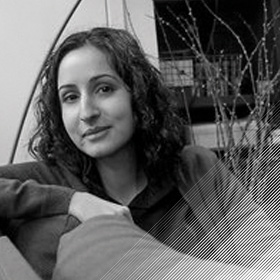KEYNOTE
MARIAM GHANI

ARTIST, WRITER, FILMMAKER, TEACHER, QUEENS COLLEGE
NEW YORK, USA
DAY 1 2:30PM
Mariam Ghani’s work explores the ways in which histories, places, identities, and communities are constructed and reconstructed. Her research-based practice spans video, installation, photography, performance, and text. Ghani’s exhibitions and screenings have been presented at venues including the Rotterdam, CPH:DOX and transmediale film festivals, the Sharjah and Liverpool Biennials, dOCUMENTA (13) in Kabul and Kassel, MoMA in New York, the National Gallery in DC, the St. Louis Art Museum, and the CCCB in Barcelona. Her writing has appeared in Creative Time Reports, Foreign Policy, Ibraaz, Triple Canopy, and the Manifesta Journal. Recent curatorial projects include the international symposium Radical Archives, the traveling film program History of Histories and the collaborative exhibition Utopian Pulse. Ghani has collaborated with artist Chitra Ganesh since 2004 as Index of the Disappeared, an experimental archive of post-9/11 detentions, deportations, renditions and redactions; with choreographer Erin Kelly since 2006 on the video series Performed Places; and with media archive collective Pad.ma since 2012 on the Afghan Films online archive. Ghani has been awarded the NYFA and Soros Fellowships, grants from Creative Capital, Art Matters, the Graham Foundation, CEC ArtsLink, NYSCA, the Mid-Atlantic Arts Foundation and the Experimental Television Center, and residencies at LMCC, Eyebeam Atelier, Smack Mellon, the Akademie Schloss Solitude, and NYU’s Asian/Pacific/American Institute. She holds a B.A. in Comparative Literature from NYU and an MFA from SVA. She is the 2014-15 Freund Teaching Fellow at Washington University in St. Louis, and will teach in the Social Practice program at Queens College starting in fall 2015.
IN CONVERSATION WITH
ASHRAF GHANI
PRESIDENT, AFGHANISTAN
KABUL, AFGHANISTAN
DAY 1 2:30PM
Mohammad Ashraf Ghani grew up in Kabul prior to pursuing his university education abroad. Like many Afghans, he was forced to remain in exile as foreign invasion and civil war led to the persecution of his family. While living abroad, Ghani received his Master’s and PhD in Anthropology from Columbia University, taught at the University of California, Berkeley and Johns Hopkins University, and became a leading scholar of political science and anthropology. Later, while working at the World Bank, he learned more about international development. Following the fall of the Taliban in 2001, Ghani returned to Afghanistan and devoted himself to rebuilding the country. He served as the chancellor of Kabul University, advised interim President Hamid Karzai, and was the Finance Minister in the Transitional Islamic State of Afghanistan. During his tenure as Finance Minister, he designed a package of reforms and initiated several public investment programs that led to significant improvements in the lives of Afghans. Although he declined to join the newly elected government in December 2004, he remained an influential voice in political circles both in Afghanistan and abroad. In 2009, President Ghani co-wrote Fixing Failed States with Clare Lockhart. The book examines unsuccessful attempts to save failing states and proposes new solutions. In 2010, he served as chairman of the Transition Coordination Commission (TCC), which was responsible for transferring security forces from foreign to national troops. In October 2013, he resigned from the TCC to run for president and was elected to the position in September 2014. President Ghani received the Atlantic Council’s Distinguished International Leadership Award in 2015.
← SPEAKERS
